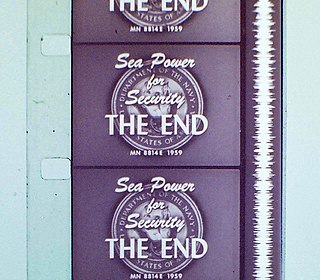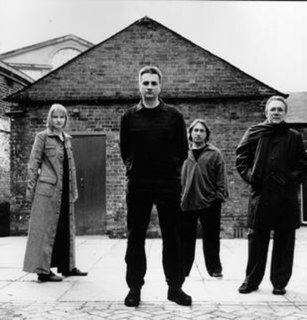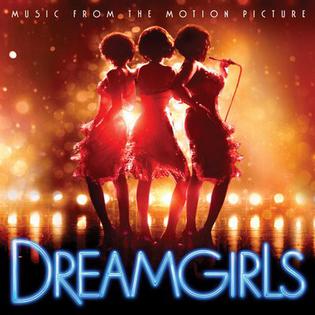
A soundtrack is recorded music accompanying and synchronised to the images of a motion picture, drama, book, television program, radio program, or video game; a commercially released soundtrack album of music as featured in the soundtrack of a film, video, or television presentation; or the physical area of a film that contains the synchronised recorded sound.

Art of Noise were an English avant-garde synth-pop group formed in early 1983 by engineer/producer Gary Langan and programmer J. J. Jeczalik, along with keyboardist/arranger Anne Dudley, producer Trevor Horn, and music journalist Paul Morley. The group had international Top 20 hits with its interpretations of "Kiss", featuring Tom Jones, and the instrumental "Peter Gunn", which won a 1986 Grammy Award.

Anne Jennifer Dudley is an English composer, keyboardist, conductor and pop musician. She was the first BBC Concert Orchestra's Composer in Association in 2001. She has worked in the classical and pop genres, as a film composer, and was one of the core members of the synthpop band Art of Noise. In 1998, Dudley won an Oscar for Best Original Musical or Comedy Score for The Full Monty. In addition to over twenty other film scores, in 2012 she served as music producer for the film version of Les Misérables, also acting as arranger and composing some new additional music.
The Black Mages were a Japanese instrumental rock band formed in 2002 by Nobuo Uematsu, Kenichiro Fukui and Tsuyoshi Sekito, who were three video game composers for Square and Square Enix. The band arranged Uematsu's Final Fantasy video game series-based compositions in a hard rock style often similar to progressive metal, achieved with the additional use of synthesizers. A year later the band expanded to six members with the addition of Keiji Kawamori, Michio Okamiya and Arata Hanyuda. In August 2010, Uematsu announced the band had been disbanded, but he would continue to perform rock arrangements of his music as a part of another similar band, known as the Earthbound Papas.
The music of the video game Final Fantasy X was composed by regular series composer Nobuo Uematsu, along with Masashi Hamauzu and Junya Nakano. It was the first title in the main Final Fantasy series in which Uematsu was not the sole composer. The Final Fantasy X Original Soundtrack was released on four Compact Discs in 2001 by DigiCube, and was re-released in 2004 by Square Enix. Prior to the album's North American release, a reduced version entitled Final Fantasy X Original Soundtrack was released on a single disk by Tokyopop in 2002. An EP entitled feel/Go dream: Yuna & Tidus containing additional singles not present in the game was released by DigiCube in 2001. Piano Collections Final Fantasy X, a collection of piano arrangements of the original soundtracks by Masashi Hamauzu and performed by Aki Kuroda, was released by DigiCube in 2002 and re-released by Square EA in 2004. A collection of vocal arrangements of pieces from the game arranged by Katsumi Suyama along with radio drama tracks was released as Final Fantasy X Vocal Collection in 2002 by DigiCube.
Final Fantasy VII is a role-playing video game developed by Square and published by Sony Computer Entertainment as the seventh installment in the Final Fantasy series. Released in 1997, the game sparked the release of a collection of media centered on the game entitled the Compilation of Final Fantasy VII. The music of the Final Fantasy VII series includes not only the soundtrack to the original game and its associated albums, but also the soundtracks and music albums released for the other titles in the collection. The first album produced was Final Fantasy VII Original Soundtrack, a compilation of all the music in the game. It was released as a soundtrack album on four CDs by DigiCube in 1997. A selection of tracks from the album was released in the single-disc Reunion Tracks by DigiCube the same year. Piano Collections Final Fantasy VII, an album featuring piano arrangements of pieces from the soundtrack, was released in 2003 by DigiCube, and Square Enix began reprinting all three albums in 2004. To date, these are the only released albums based on the original game's soundtrack, and were solely composed by regular series composer Nobuo Uematsu; his role for the majority of subsequent albums has been filled by Masashi Hamauzu and Takeharu Ishimoto.

Below the Waste is Art of Noise's fourth full-length original album and their last album for China Records before Anne Dudley re-formed the group with ZTT's Trevor Horn and Paul Morley for 1999's The Seduction of Claude Debussy.

Black Light Burns is an American industrial metal band fronted by Wes Borland. Founded in 2005 after Borland departed Limp Bizkit, the band's lineup also includes Nick Annis, Dennis Sanders and Dylan Taylor. Their debut album, Cruel Melody, was released in June 2007 to critical acclaim. They released a covers and b-sides CD/DVD combo package in the summer of 2008 titled Cover Your Heart and the Anvil Pants Odyssey. After a temporary hiatus, the band regrouped in 2012 and released their second album, The Moment You Realize You're Going to Fall in August. The band released a concept album, Lotus Island, in January 2013.
The music of the video game Final Fantasy XII was composed primarily by Hitoshi Sakimoto. Additional music was provided by Masaharu Iwata and Hayato Matsuo, who also orchestrated the opening and ending themes. Former regular series composer Nobuo Uematsu's only work for this game was "Kiss Me Good-Bye", the theme song sung by Angela Aki. The Final Fantasy XII Original Soundtrack was released on four Compact Discs in 2006 by Aniplex. A sampling of tracks from the soundtrack was released as an album entitled Selections from Final Fantasy XII Original Soundtrack, and was released in 2006 by Tofu Records. Additionally, a promotional digital album titled The Best of Final Fantasy XII was released on the Japanese localization of iTunes for download only in 2006. "Kiss Me Good-Bye" was released by Epic Records as a single in 2006, and Symphonic Poem "Hope", the complete music from the game's end credits, was released by Hats Unlimited in 2006. An abridged version of the latter piece, which originally accompanied a promotional video for the game, was included in the official soundtrack album. An album of piano arrangements, titled Piano Collections Final Fantasy XII, was released by Square Enix in 2012.

Concrete is a live album by the British band Pet Shop Boys. It was released on 23 October 2006. Due to be called Concert, on 20 September 2006, Pet Shop Boys announced that the album was going to be called Concrete, which was the title that they originally wanted for the album. It is the first live concert to be released by the band on Audio CD.

Dreamgirls: Music from the Motion Picture is a soundtrack album for the 2006 film Dreamgirls. The album was released by Music World Entertainment and Columbia Records on December 5, 2006 in two versions: a single-disc standard release, and a two-disc deluxe edition. The one-disc version includes highlights from the film's songs, including "And I Am Telling You I'm Not Going", "One Night Only", and "Listen", while the two disc version includes all songs present in the film alongside several bonus tracks.

"You Know My Name" is the theme song of the 2006 James Bond film Casino Royale, performed by American musician Chris Cornell, who wrote and produced it jointly with David Arnold, the soundtrack's composer. The film producers chose Cornell because they wanted a strong male singer. Cornell and Arnold tried to make the song a replacement theme for the character instead of the "James Bond theme" reflecting the agent's inexperience in Casino Royale, as well as an introduction to Daniel Craig's grittier and more emotional portrayal of Bond.
The music of the video game Final Fantasy VIII was composed by regular series composer Nobuo Uematsu. The Final Fantasy VIII Original Soundtrack, a compilation of all music in the game, was released on four Compact Discs by DigiCube in Japan, and by Square EA in North America. A special orchestral arrangement of selected tracks from the game—arranged by Shirō Hamaguchi—was released under the title Fithos Lusec Wecos Vinosec Final Fantasy VIII, and a collection of piano arrangements—performed by Shinko Ogata—was released under the title Piano Collections Final Fantasy VIII.
The music of the video game Final Fantasy IV was composed by regular series composer Nobuo Uematsu. The Final Fantasy IV Original Sound Version, a compilation of almost all of the music in the game, was released by Square Co./NTT Publishing, and subsequently re-released by NTT Publishing. It was released in North America by Tokyopop as Final Fantasy IV Official Soundtrack: Music from Final Fantasy Chronicles, with one additional track. It has since been re-released multiple times with slight changes as part of the Final Fantasy Finest Box and as Final Fantasy IV DS OST. An arranged album entitled Final Fantasy IV Celtic Moon, containing a selection of musical tracks from the game performed in the style of Celtic music by Máire Breatnach, was released by Square and later re-released by NTT Publishing. Additionally, a collection of piano arrangements composed by Nobuo Uematsu and played by Toshiyuki Mori titled Piano Collections Final Fantasy IV was released by NTT Publishing.
The music of the video game Final Fantasy III was composed by regular series composer Nobuo Uematsu. Final Fantasy III Original Sound Version, a compilation of almost all of the music in the game, was released by Square Co./NTT Publishing in 1991, and subsequently re-released by NTT Publishing in 1994 and 2004. The soundtrack to the remake of Final Fantasy III for the Nintendo DS, Final Fantasy III Original Soundtrack was released by NTT Publishing in 2006, with revamped versions of the tracks and additional tracks. A vocal arrangement album entitled Final Fantasy III Yūkyū no Kaze Densetsu, or literally Final Fantasy III Legend of the Eternal Wind, contained a selection of musical tracks from the game. The tracks were performed by Nobuo Uematsu and Dido, a duo composed of Michiaki Kato and Shizuru Ohtaka. The album was released by Data M in 1990 and by Polystar in 1994.
The music of the MMORPG Final Fantasy XI was composed by Naoshi Mizuta along with regular series composer Nobuo Uematsu and Kumi Tanioka. The Final Fantasy XI Original Soundtrack, a compilation of almost all of the music in the game, was released by DigiCube in 2002, and subsequently re-released by Square Enix in 2004. Final Fantasy XI Rise of the Zilart Original Soundtrack was released by DigiCube in 2003 after the release of the Rise of the Zilart expansion for Final Fantasy XI, and re-released by Square Enix in 2004. Final Fantasy XI Chains of Promathia Original Soundtrack was produced by Square Enix in 2004 after the release of the Chains of Promathia expansion, and in 2005 Square Enix published Music from the Other Side of Vana'diel, a collection of arranged tracks from the game performed by The Star Onions, a group composed of Square Enix composers including Naoshi Mizuta, Kumi Tanioka and Hidenori Iwasaki. Final Fantasy XI Treasures of Aht Urhgan Original Soundtrack was released by Square Enix in 2006 for the Treasures of Aht Urhgan expansion.

The music of the Kingdom Hearts video game series was composed by Yoko Shimomura with orchestral music arranged by Kaoru Wada. The original soundtracks of the games have been released on three albums and a fourth compilation album. The soundtracks to the Kingdom Hearts games feature several musical pieces from both Square Enix and Disney works, including such pieces as "Mickey Mouse Club March" by Jimmie Dodd, "This Is Halloween" by Danny Elfman, and "One-Winged Angel" by Nobuo Uematsu. They also feature several vocal songs, the most notable being the four main theme songs: "Hikari", "Passion", "Chikai", and "Face My Fears." The two themes were written and performed by Japanese American pop star Utada Hikaru; in addition to Japanese, English versions of the first three songs were produced, titled "Simple and Clean", "Sanctuary", and "Don't Think Twice", respectively.

Buster: The Original Motion Picture Soundtrack is the soundtrack for the 1988 British film Buster. The album is essentially a collection of oldies, tucked in between two Phil Collins songs that were recorded for the film, in which he starred. "Two Hearts" was specially written for the film, having earned a Grammy Award for Best Song Written Specifically for a Motion Picture or Television in 1989, a Golden Globe Award for Best Original Song as well as an Academy Award nomination for Best Original Song, and "A Groovy Kind of Love" with a Grammy Award nomination for Best Pop Vocal Performance, Male was a remake of a song taken to #2 in the UK Singles Chart in 1965 by The Mindbenders. Both were released as singles, and topped the Billboard Hot 100 chart, with "A Groovy Kind of Love" also reaching #1 in the UK. Other new songs include Collins' "Big Noise" and Four Tops' "Loco in Acapulco", co-written by Collins. At the Brit Awards in 1989 it won for Soundtrack/Cast Recording, while Collins received the award British Male Artist for his contribution to the soundtrack album.
The Xenosaga (ゼノサーガ) series is a series of science fiction role-playing video games developed by Monolith Soft and published by Namco Bandai on the PlayStation 2. The series began with the 2002 release of Episode I: Der Wille zur Macht, which was followed in 2004 by Episode II: Jenseits von Gut und Böse and in 2006 by Episode III: Also sprach Zarathustra. The music of Xenosaga includes the soundtracks to all three chapters, as well as the music for its spin-off media. These include Xenosaga Freaks, a set of minigames set between the first two chapters, Xenosaga I & II, a Nintendo DS remake of the first two chapters, and Xenosaga: The Animation, an anime series covering the events of the first game. Episode I was composed by Yasunori Mitsuda, Episode II was split between Yuki Kajiura and Shinji Hosoe, and Episode III was composed by Kajiura alone. Xenosaga Freaks reused some of the music of Episode I by Mitsuda while also including new work by Shinji Hosoe, Ayako Saso, Masashi Yano, Keiichi Okabe, Satoru Kōsaki, and Hiroshi Okubo, while Xenosaga I & II and Xenosaga: The Animation used new pieces composed by Kousuke Yamashita.
The music of the video game Final Fantasy XIII was composed by Masashi Hamauzu. Former regular series composer Nobuo Uematsu did not contribute any pieces to the soundtrack. Music from the game has been released in several albums. The main soundtrack album, Final Fantasy XIII Original Soundtrack, was released on four Compact Discs in 2010 by Square Enix, the developers and producers of the game. Selections from the soundtrack have been released on two gramophone record albums, W/F: Music from Final Fantasy XIII and W/F: Music from Final Fantasy XIII Gentle Reveries, both in 2010 by Square Enix. An album of arranged pieces from the soundtrack, Final Fantasy XIII Original Soundtrack -PLUS-, was also released by Square Enix in 2010, as was an album of piano arrangements, Piano Collection Final Fantasy XIII. The theme song for the Japanese version of the game, "Kimi ga Iru Kara", was released as a single by For Life Music in 2009.










